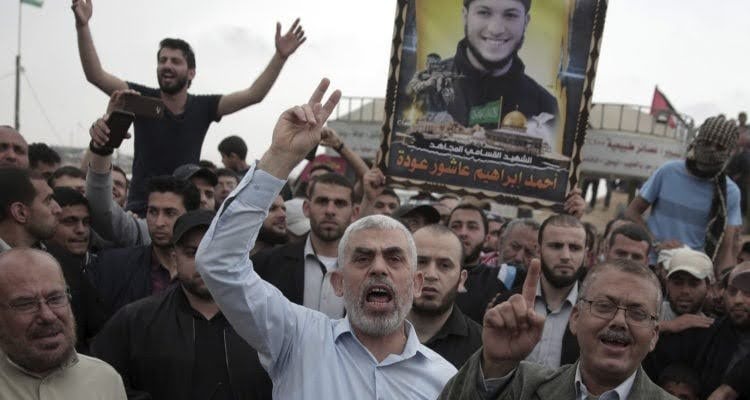Hamas leaders abroad met earlier this month in Qatar over concerns that the terror group was being trounced by the IDF in Gaza. But then, the Wall Street Journal reported, a courier arrived with a message from Hamas leader in Gaza Yahya Sinwar: “Don’t worry, we have the Israelis right where we want them.”
The reassuring message from Sinwar said that Hamas’s military operatives, the Al-Qassam Brigades, were fine and that they were even ready for Israel to invade Rafah. And the high death toll among Gazan civilians? Sinwar said that the many fatalities are good for Hamas as it will increase international pressure on Israel to stop the war.
The report continues by saying that although Hamas is “waging an unequal fight with the strongest military in the Middle East,” Sinwar, the mastermind of the attack is “playing a different game.”
His goal is for Hamas to emerge from the rubble of Gaza after the war, declare a historic victory by outlasting Israel’s firepower, and claim the leadership of the Palestinian national cause.
The terrorists, commanded day-to-day by Sinwar’s brother Mohammed, have changed their tactics since a short cease-fire in November. Hamas terrorists are now trying to avoid large firefights and instead use small-scale ambushes—using tools ranging from rocket-propelled grenades to recorded voices of hostages to lure Israeli troops into traps.
“It’s a very sound tactical logic,” said Eyal Berelovich, a civilian analyst for Israel’s armed forces and a military historian at Jerusalem’s Hebrew University. “Their strategic goal is to survive.”
The report said that many Israelis in the military, from “senior commanders to ordinary soldiers” are concerned that “their accumulation of tactical wins on the battlefield might not add up to a lasting strategic victory.”
Fighting the enemy is like a game of whack-a-mole,” said an Israeli reservist in Khan Younis with the 98th Division. He said many soldiers sense the lack of a plan and wonder what their efforts are for. “It will be very hard to destroy Hamas.”
Degrading Hamas’s capabilities is a realistic goal for Israel’s military, said Hussein Ibish, a scholar at the Arab Gulf States Institute, a think tank in Washington. But sustaining it would require fully occupying Gaza, which would give Hamas a target for a never-ending insurgency, he said. “Recent history shows that you can be an effective insurgency on a shoestring,” said Ibish. “Anyone can make an IED,” or homemade bomb, he said. “It’s easy to get a pistol. If you’re willing to die, you can kill soldiers.”
The Israeli army has found no systematic solution for finding and destroying Hamas’s tunnels, many soldiers said. Tunnel entrances have been found in homes, schools, mosques, courtyards, streets and farm fields. Some are covered by steel doors, others by mattresses in a home. Israeli forces have mostly relied on drones and robots to search tunnels, only sending soldiers in later to avoid firefights in the narrow passages.
The war is becoming a series of sporadic encounters with individual terrorists who try to shoot at Israeli soldiers or set off explosives, the commander of an Israeli unit tasked with reaching and evacuating wounded soldiers said. His unit is rescuing wounded men every two to three days now. At the start of the invasion, it was dealing with between five and 10 wounded soldiers every day. “The pace of events and the intensity is declining. We see there is less and less of the enemy.”
“I didn’t see a single soul,” Israeli staff sergeant Corey Feldman said of his combat experience in Gaza. “We were shot at every day,” he said, but usually the enemy quickly disappeared. “They didn’t stick around long enough to engage in firefights.”
The scale of Hamas’s tunnel network distinguishes the fighting in Gaza from any other battles between regular forces and Islamist militant groups in recent history, say military analysts.
Hamas uses the tunnels as military headquarters, to maneuver across the enclaves’ cities, protect its leaders, hide Israeli and other hostages, manufacture weapons and conduct hit-and-run attacks. “Until you take all of this away from Hamas you won’t be able to beat it,” said Guy Aviad, a researcher on Hamas and former Israeli officer.
(YWN Israel Desk – Jerusalem)












4 Responses
The report said that many Israelis in the military, from “senior commanders to ordinary soldiers” are concerned that “their accumulation of tactical wins on the battlefield might not add up to a lasting strategic victory.”
In other words: the army is useless – ONLY CHASDEI HASHEM IN Z’CHUS HATORAH that protects us!!
מה עוד חדש? י
So many generations of being secular has dumbed down the the liberal and secular Israelis. They cannot get it into their thick skulls that 95% of Gazans support terrorism; whichever Gazan has the ability is engaged in terrorism. Children killing Jews brings honor to Fakestinian parents, that is their nachas. The Fakestinians are ALL Hamas! Stop sending aid to them and ship them out to other countries whose leaders will gladly take them for the right price. Otherwise you will not win this war. The Fakestinian population is brainwashed and propagandized, from babies to old, they have the same goal in mind which they do not hesitate to repeat over and over again; they want the dissolution of Israel and to annihilate all Jews. They keep on saying that, why are the Israelis not listening?
“…. Gazan deaths are good for us.” Sinwar said.
I think his wish should be accommodated.